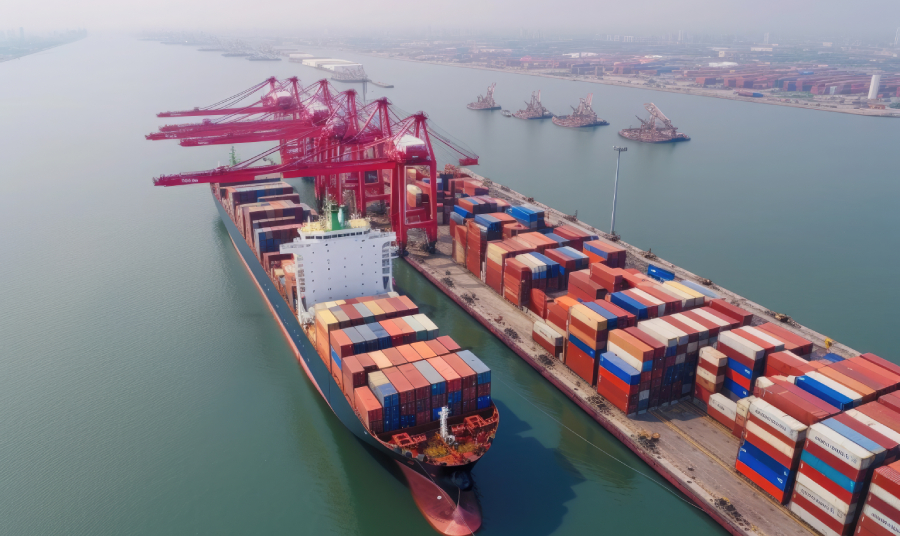Setting up shop: Trade regulations in Singapore
Singapore is a business-friendly country that attracts small and medium-sized enterprises (SMEs) worldwide. Here are some important things to consider when starting an e-commerce business in Singapore.

On the whole, Singapore adopts a welcoming attitude to international trade. Businesses — even small businesses — don’t generally have trouble setting up shop, and consumers in the country tend to be receptive to foreign-made goods.
Having said that, some noteworthy trade regulations in Singapore are worth learning about before you break into the market.
We’ll answer the biggest question right at the beginning of this article: why choose Singapore? Then, we’ll dive into a few surprising Singaporean barriers to trade. We’ll end with a practical rundown of what it takes to set up a physical or online marketplace presence — including options for international currency transfer.
- Why choose Singapore?
- Barriers and trade regulations in Singapore
- Setting up shop in Singapore
Why choose Singapore?
In a literal world of possibilities, why should businesses choose Singapore as an expansion destination? The answer lies mainly in Singapore’s reputation as an accessible business hub.
A sovereign island city-state, Singapore sits on the southern tip of the Malay Peninsula in South East Asia. It’s a free port — a free-trade zone: businesses are generally charged low taxes to encourage economic activity. The primary working language is English, so communication is easy. The city nation’s skilled workforce makes it an obvious choice for discerning manufacturing companies.
Let’s unpack a few of the main reasons businesses love Singapore.
Perk 1: Low taxes
First, Singapore operates on a territorial tax system, meaning that income generated from Singaporean sources will be taxed. Also, businesses must register for Goods and Services Tax (GST) if their taxable turnover exceeds SGD 1 million per year. GST is a value-added tax levied on the supply of goods and services within Singapore, and the current rate is 8%.
In addition to GST, Singapore also has a corporate income tax (CIT) system where businesses are taxed on their income earned in Singapore. The current CIT rate is 17%, typically lower than you might see in the US. Singapore also offers businesses a range of tax perks and reliefs, such as tax exemptions for newly incorporated companies, partial tax exemptions for small and medium-sized enterprises, and tax incentives for specific industries.
If you’re a US citizen running a business in Singapore, it’s important to remember that you still need to comply with US tax regulations. This means reporting your foreign income and assets to the Internal Revenue Service (IRS) on your tax returns. The good news is that there’s a tax treaty in place between the US and Singapore to prevent double taxation. So, depending on your circumstances, you can claim foreign tax credits to offset your US tax liability.
But as always, it’s a good idea to consult with a tax professional familiar with US and Singapore tax laws to ensure that you follow all the applicable regulations.
Perk 2: Thriving economy
Global accolades for Singapore run thick in the corporate world. According to the Global Talent Competitiveness Index (GTCI) 2022, Singapore is the second most talent-competitive nation. In 2022, the World Bank also ranked Singapore third on its list of best countries to do business.
Singapore’s economy isn’t just growing — it’s flourishing. Finance, trade, and manufacturing account for a lot of its economic activity, and there are government initiatives for businesses (especially, as we mentioned above, for small businesses), which are designed to encourage foreign investment.
Perk 3: Skilled workforce
Singapore has a low unemployment rate and a skilled workforce; people are highly educated, and most individuals benefit from having access to high quality institutes of higher learning. Across the board, students graduate from educational institutions and enter the world of work with great qualifications.
Foreign companies in the biomedical sciences, logistics, chemicals, electronics, and transport engineering sectors benefit greatly when they set up shop in Singapore. It is relatively easy to get a Singapore Entrepreneur Visa (EntrePass). You must ensure you meet the right criteria, prove that you own at least 30% shares in your company, have received funding, and have an innovative company that can provide jobs.
Barriers and trade regulations in Singapore
As a free port, Singapore isn’t known for stringent trade regulations, but the rules it does have can seem unusual — at least, at first glance. Here are some of the most interesting restrictions companies face when expanding into Singapore.
Motorcycle hurdles
Singapore has a tiered motorcycle operator licensing system based on engine displacement. Motorcycle road tax in the country is also based on engine size. The upshot? Motorcycle companies sometimes find it challenging to expand into the region because of a lack of demand for powerful engines.
Importing alcohol
Alcohol duties in Singapore are generally higher than in the US. In Singapore, duty costs are determined by the alcohol type and strength of the alcohol per liter.
What is the US-Singapore Free Trade Agreement?
The US-Singapore Free Trade Agreement (USSFTA) went into effect in 2004 and removed tariffs and other trade restrictions between the US and Singapore. The agreement includes various sectors, including telecommunications, information technology, and financial services.
Along with preserving intellectual property rights, it has measures for enforcing labor and environmental laws. With the USSFTA’s implementation, there has been an increase in investment and commerce between the US and Singapore. American exports to Singapore increased by 13.3% in the past year alone.
Starting an e-commerce business in Singapore
Setting up an e-commerce business in Singapore is straightforward and generally only takes one to three days. US Businesses can register with the Accounting and Corporate Regulatory Authority (ACRA) and obtain a Unique Entity Number (UEN). From there, they can set up a website and start selling products.
However, businesses need to be aware of some important regulations that apply to e-commerce. For instance, companies must comply with Singapore’s Personal Data Protection Act (PDPA) and obtain customers’ consent before collecting and using their personal information. Businesses must also comply with the Electronic Transactions Act (ETA) and issue receipts and invoices electronically.
Lazada and LazMall: Singapore’s online marketplaces
Small businesses that want to sell to consumers online in Singapore generally set up profiles on Lazada. Foreign SME owners with successful LazGlobal Seller accounts can apply for LazMall accounts after six months.
Here’s a step-by-step breakdown of how to set up a Lazada’ LazGlobal Seller’ marketplace account:
- Set up your company in Singapore: Before you do anything else, set up a subsidiary in Singapore and create a logistics and shipping plan.
- Create a Lazada account: Go to the Lazada website and create a new LazGlobal Seller account.
- Supply all the required documents: You’ll need to provide a valid personal ID, your company tax ID, proof of business address, proof of business registration, and other documents to open a LazGlobal Seller account.
- Create your Lazada store: Once your account is approved, you can create your Lazada storefront and load it with products.
- Consider Hong Kong fulfillment: You can ship products directly to consumers who purchase from your store or stock them at Lazada’s fulfillment center in Hong Kong. If you choose the second option, Lazada will fulfill your orders (for a fee).
- Connect a collections account: To retrieve money from your Lazada account, you’ll need to connect a collections account — a Zyla account, for instance, is easy to set up and has no subscription or minimum deposit charges.
Moving money out of Singapore
Ready to expand into Singapore? In that case, you’ll almost certainly have to move money into and out of the country. Currency transfer options include:
- High street banks: Until recently, traditional bank transfers were the most accessible currency transfer partners for businesses. Unfortunately, bank fees can be expensive, and the SWIFT system can be slow — particularly between the US and South East Asia.
- Challenger companies: Digital currency transfer partners like Zyla can move money quickly and provides an alternative to having a direct banking relationship.
At first glance, traditional bank transfers seem reassuringly straightforward. But fees can soon add up and eat into your profit margins. To preserve as much capital as possible, many business owners switch to reliable payment partners before they expand internationally.
Expand into South East Asia with Zyla
If you’ve been successful in the US, you might decide to expand abroad. Singapore is a major expansion destination for US companies because it has a vibrant economy, a welcoming stance to international trade and a receptive consumer base.
Breaking into a new market demands practical planning. Before trading with wholesalers or setting up new marketplace accounts, think about how you’ll move money between Singapore and the US.
The Zyla Account is the hassle-free way to pay business partners and get paid from marketplaces quickly.
- Open multi-currency accounts with local account details
- Make fast and secure global payments to suppliers, staff and partners
- Collect funds from marketplace sales
- Keep costs down with competitive rates
The free-to-open Zyla Account enables businesses to make collections and payouts internationally – giving you the freedom to do business anywhere, all with the security of our online platform. Open an account today and you could be approved, set up and trading internationally in 24 hours. Get started or find out more by calling (855) 797-3366 today.



